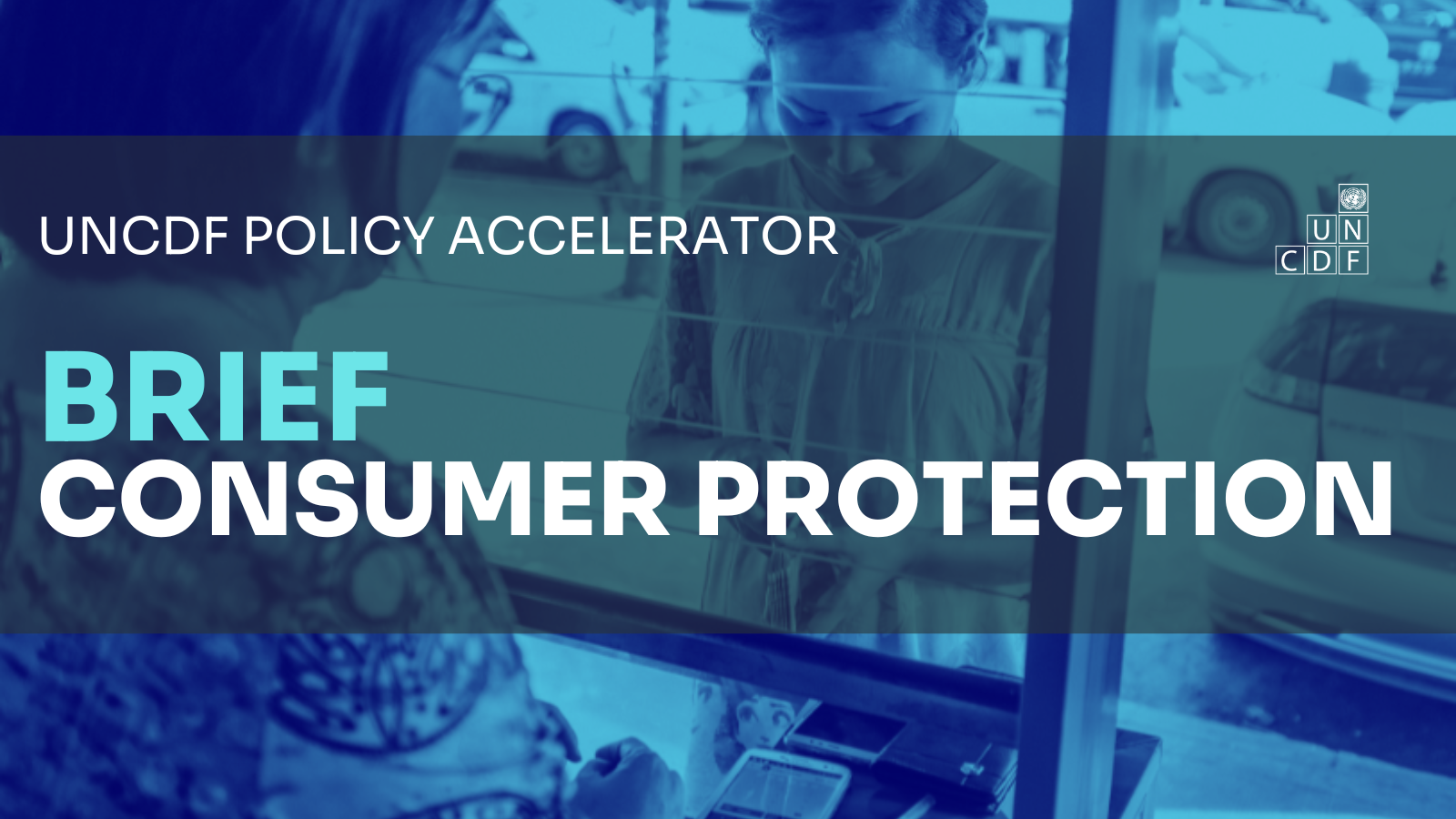
Financial consumer protection
We advance policies and regulations focused on financial consumer protection, an essential part of improving financial inclusion, well-being and resilience.
The need for financial consumer protection
Our focus on financial consumer protection is in direct response to the acceleration of the adoption of digital financial services (DFS).
Findex data shows that in 2021, 71% of adults in developing economies now have a formal financial account, compared to 42% in 2011. The adoption of DFS was also largely boosted by the COVID-19 pandemic. The data highlights that about one-third of adults in developing economies who paid a utility bill directly from an account did so for the first time after the start of the pandemic (World Bank 2022).
Despite this growth in the adoption of DFS, accessing and using digital financial services continues to be a challenge for many people, especially in developing countries. Highlights from Findex 2021 include:
One-third of mobile money account holders in Sub-Saharan Africa cannot use their account without help from a family member or an agent
A common complaint among those receiving government transfers as digital payments is, for example, that the payment products are difficult to use. Recipients reported struggling with long queues at bank agents and receiving little help when faced with questions or issues about their payments.
One in five adults in developing economies who receive a wage payment into a financial institution account paid unexpected fees on the transaction.
Policies and regulations that protect users of DFS have not kept up with the increased risks that consumers are facing.
Regulators and policymakers are facing a rapidly changing digital economic landscape, which includes new providers, new business models, new technologies, and the need for increased collection and analysis of customer data.
Prioritising financial consumer protection in policy and regulation
Consumer protection is essential for building safety and trust in the financial system. It can lead to:
Higher quality products and services, especially for underserved groups
More affordable and accessible DFS products
Improved redress mechanisms for customer complaints
Increased control over financial resources
Consumer protection is also a precondition for improving financial inclusion, well-being and resilience.
Our approach
“Despite this growth in the adoption of DFS, accessing and using digital financial services continues to be a challenge for many people, especially in developing countries.”
Our approach to improving financial consumer protection takes into account the rapidly changing landscape for digital financial services and the challenges that regulators and policymakers face in addressing emerging risks.
With the “PRIME” approach – Priority, Regulation, Inclusion, Monitoring and Supervision, and Empowerment – regulators and policymakers choose the entry points that are most relevant to them, and we support them in adapting global and peer lessons to their context. We also work with them to draft, review, adapt and expand legal, regulatory and supervisory frameworks for consumer protection with a focus on:
Fair treatment
Disclosure and transparency
Data protection and privacy
Complaints management
We have refined this approach through in-country collaboration with regulators in developing economies, and we use it to guide our own work on financial consumer protection.
Learn more about how we put this into practice:
+ PRIORITY: Making financial consumer protection a priority in the policy design process
UNCDF not only focuses on why digital financial inclusion is important, but also on how to make progress towards high-quality regulation and supervision and long-term change for the benefit of society.
In the context of financial consumer protection, we support regulators in taking the following practical steps to build an effective regulatory and supervisory framework:
Make a permanent policy commitment to financial consumer protection (e.g. formal strategy, ministerial statement) with clear roles and responsibilities, specific and measurable objectives, and practical activities and timelines.
Clarify and strengthen institutional arrangements and mandates, including adequate supervision and enforcement powers in relation to consumer protection.
Allocate sufficient resources and staff to write, evaluate and improve regulations and carry out supervision activities, including engagement with ministries on budget allocations if necessary.
Identify a policy champion and establish regulatory coordination mechanisms with other authorities with consumer protection mandates.
Include consumer voices in the policy design process to achieve more customer-centric outcomes with a focus on vulnerable groups, including women. (See more in "Inclusion" below.)
- Work with partners across different sectors to align on goals and avoid duplicating efforts.
Highlights
- In Sierra Leone, we collaborated closely with the Bank of Sierra Leone (BSL) to identify a policy champion and make consumer protection a priority. We reviewed its new financial consumer protection guidelines and supported a public consultation process, which prioritized feedback from consumer voices as well as knowledge exchange with peer markets.
- In Gabon, in collaboration with UNCTAD, UNCDF explored the DFS landscape to strengthen Gabon’s regulatory framework on FCP with a focus on DFS.
- We work closely with Consumers International to support strengthening consumer voices in the policy design process with a focus on customer-centric outcomes.
+ REGULATION: Providing technical support
UNCDF provides technical support on consumer protection regulation, particularly in the context of digital financial services. We focus on basic rules in relation to fair treatment, data protection and privacy, complaints management and disclosure and transparency.
Depending on a country's needs, UNCDF offers ongoing support to staff on activities such as:
Assisting in drafting new or updated regulations
Reviewing and providing comments on regulations
Assessing national and regional regulatory frameworks to identify current gaps and opportunities for improvement
Reviewing relevant global standards and guidance (such as the World Bank’s Good Practices for Financial Consumer Protection, 2017 Edition)
Learning from examples of similar regulations in other countries and regions and sharing best practices
Analysing regulatory options (e.g., centralising requirements in standalone regulations, adding requirements to separate financial sector-specific regulations, inserting references to financial services in general consumer protection regulations)
Reviewing existent financial consumer protection regulations as well as other related laws and regulations to propose opportunities for harmonization
Assisting in writing memos and preparing presentations to create internal buy-in, especially among senior management
Highlights
- In Malawi, we are collaborating closely with the Reserve Bank Malawi on its new Financial Consumer Protection Bill to identify policy options.
- In the Solomon Islands, we worked closely with the Central Bank of Solomon Islands to review its Financial Consumer Protection Guidelines that set the path for better consumer protection.
- In Cameroon, in collaboration with UNDP, UNCDF is one of the implementing partners for the National Financial Inclusion Strategy working group on financial consumer protection.
+ INCLUSION: Supporting the public and private sectors to address consumer needs
UNCDF supports the public and private sectors to address consumer needs, especially consumers who are often exluded from formal account ownership.
For example, while the gender gap account ownership in developing economies has narrowed (from 9 to 6 percentage points), it still persists. Reasons for this gap include the lack of identification, the lack of mobile phone, and the need for support in opening and using a financial account.
FCP plays a key role in reducing the gender gap by creating safeguards that empower consumers while building trust in the formal financial system.
Depending on a countries' needs, UNCDF offers ongoing support to staff on activities such as:
Strengthening the collection, analysis and usage of sex-disaggregated data remain key to identify current trends and address gaps. This data can be used to design products and services that respond to women’s needs and address their barriers.
Collecting, storing and managing complaints with a focus on gender, which allows regulators to better understand the main challenges faced by female customers and adapt regulations and policy interventions accordingly.
Including consumer voices from policy design to implementation, (e.g., when reviewing National Financial Inclusion Strategies to achieve more customer-centric outcomes with a focus on vulnerable groups).
Supporting regulators in gender-intentional public awareness raising campaigns that highlight the importance of financial education and digital literacy.
Highlights
- UNCDF created an advisory panel with more than 40 women and men in the CEMAC region to share expectations, concerns and recommendations for women financial inclusion. In July 2022, UNCDF published a report highlighting 23 recommendations, eight of which focus on consumer protection.
- In Ethiopia, together with Women’s World Banking, UNCDF launched a Global Hub that aims to close the gender gap in access to digital technology, skills, and digital financial products for women entrepreneurs – particularly in developing countries.
+ MONITORING AND SUPERVISION: Ensuring compliance and managing risks
Monitoring market conduct is crucial to identify whether financial service providers actual comply with the set supervisiory rules.
Supervision is integral to a balanced and effective regulatory framework. Under a risk-based approach, supervisors can build risk profiles, conduct risk assessments and monitor indicators to systematically identify, measure and monitor risks. This enables them to better understand current and emerging risks and allocate scarce resources to the sectors, providers and products that pose the greatest consumer risks.
UNCDF supports regulators by:
Developing detailed consumer protection supervisory programs, based on an assessment of relevant consumer risks in relation to available supervisory resources.
Building staff capacity on adapting existing supervisory tools and techniques to monitor financial consumer protection (e.g. complaints data reporting, onsite and offsite examinations, thematic reviews, mystery shopping, ongoing market monitoring).
Delivering workshops on market conduct supervision tools and techniques, including data collection and analysis and the link to evidence-informed regulations.
Reviewing country specific market conduct manuals.
Highlights
In Sierra Leone, UNCDF’s engagement is ongoing and focuses on providing technical assistance for the implementation of the Financial Consumer Protection Guidelines as well as the National Financial Inclusion Strategy with a focus on supervision and monitoring.
We work in close collaboration on market conduct with CGAP to leverage CGAPs latest research in developing countries by introducing governments to CGAPs market monitoring tools.
+ EMPOWERMENT: Through capacity-building and evidence-based decision making
Capacity-building and data analysis are cornerstones of UNCDF's work.
At every stage of the policymaking process, we emphasize the importance of sustainable solutions. We do this through building local knowledge, skills and systems for regulators and supervisors to continue to deliver without reliance on external support or funding. UNCDF supports regulators in building capacity by:
- Providing scholarships on DFS, FCP, data analytics and women digital financial inclusion, among many others
Delivering workshops on various topics
Tracking participations, involving Human Resources for transferring knowledge within the institution
Organizing peer learning visits to other markets
Providing tools and guides that provide guidance from policy analysis to design to implementation
UNCDF supports regulators in managing data by:
- Supporting the development of data templates for complaints-handling and for financial inclusion indicators





